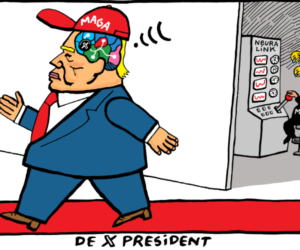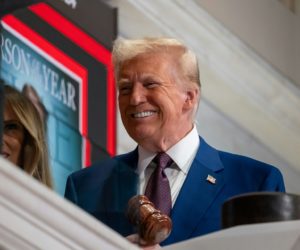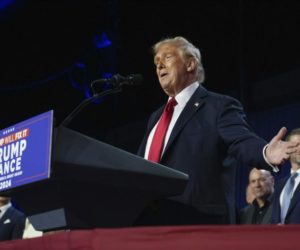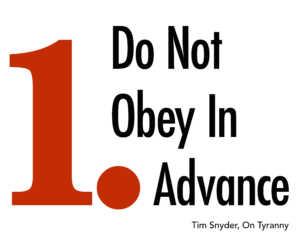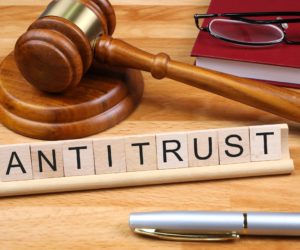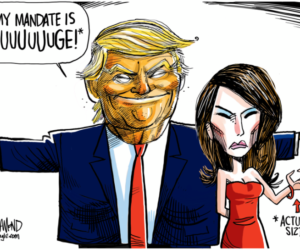Wikileak’s Julian Assange has finally been arrested and it seems likely he’ll be extradited to the United States:
Nearly seven years after WikiLeaks founder Julian Assange sought refuge in the Ecuadoran Embassy in London, Ecuador revoked his asylum Thursday. Here is what has happened since.
? London’s Metropolitan Police entered the embassy and arrested Assange “on behalf of the United States.”
? Assange was found guilty in a British court of breaching bail in 2012.
? A U.S. federal court unsealed a 2018 indictment charging Assange with conspiring to hack a Defense Department computer.
British authorities arrested WikiLeaks founder Julian Assange on Thursday in response to an American extradition request, and a U.S. federal court unsealed an indictment charging him with a single count of conspiracy to hack a classified Defense Department computer.
Assange was taken into custody by British police after Ecuador rescinded his asylum at its embassy in London, ending a media-saturated standoff that lasted nearly seven years.
London’s Metropolitan Police said that Assange, 47, was “arrested on behalf of the United States authorities.” British authorities originally sought custody of Assange for jumping bail after Sweden requested his extradition in a separate case stemming from sexual assault allegations.
In an indictment unsealed hours later in Virginia, Assange was accused of conspiring in 2010 with Chelsea Manning, a U.S. Army intelligence analyst then known as Bradley Manning, to crack a password so that the young Army private could illegally obtain secret U.S. military and diplomatic documents whose dissemination could be used to injure the United States.
In his subsequent appearance in court in London on Thursday, Assange was quickly found guilty of breaching his bail, an offense that carries a prison sentence of up to 12 months. He pleaded not guilty to the bail-jumping charge.
Judge Michael Snow reprimanded Assange and said he demonstrated “the behavior of a narcissist.” The court was told that Assange resisted arrest at the Ecuadoran Embassy, shouting, “This is unlawful!”
President Donald Trump responded by making an assertion that is a lie — backed up by a LOT of videotape:
President Trump on Thursday sought to distance himself from WikiLeaks after founder Julian Assange’s arrest in London, even though he praised the group during the 2016 presidential campaign.
“I know nothing about WikiLeaks. It’s not my thing,” Trump told reporters in the Oval Office when asked if he still loves the organization.
The president said he has “been seeing what’s happened with Assange” but added that what happens next is up to Attorney General William Barr.
Assange could be extradited from the United Kingdom in order to face a computer hacking charge in the U.S.
Trump repeatedly professed his affinity for WikiLeaks during the 2016 campaign, when it published emails that were stolen from Democrats by Russian hackers as part of Moscow’s effort to hurt Democratic presidential nominee Hillary Clinton.
“I love WikiLeaks,” Trump said at an October 2016 rally in Pennsylvania.
“Getting off the plane, they were just announcing new WikiLeaks, and I wanted to stay there, but I didn’t want to keep you waiting,” he said four days before Election Day that year. “Boy, I love reading those WikiLeaks.”
Trump mentioned WikiLeaks 145 times in the final month of the campaign alone, according to NBC News.
A Trump campaign official ordered longtime Trump adviser Roger Stone to contact WikiLeaks about the hacked Democratic emails, according to federal prosecutors. Stone was charged with lying, obstruction and witness tampering by special counsel Robert Mueller during his probe into Russia’s election interference in 2016.
The big question is the eventual impact of his arrest. Another question has been: why did Ecuador kick him out. And The Daily Beast provides the answer:
Six years, nine months and 24 days after walking into the Ecuadorian embassy in London and declaring asylum, WikiLeaks founder Julian Assange was dragged back out onto the streets by British police officers.
A few hours later, federal prosecutors in Virginia unsealed an indictment accusing Assange of conspiring with Chelsea Manning to crack a password to swipe classified documents from government computers nearly a decade ago.
Assange, 47, who was pale and heavily bearded, shouted “The U.K. must resist!” as he was bundled towards a waiting police vehicle by a clutch of officers. He appeared to be carrying a copy of Gore Vidal’s book History of The National Security State.
His dramatic expulsion from the embassy follows a year of ratcheting tension between Assange and his Ecuadorian hosts, culminating in WikiLeaks publicizing a leak of hundreds of thousands of hacked emails mysteriously stolen from the inboxes of Ecuador’s president and first lady.
It was this last move that finally set Ecuador’s government firmly against Assange, who was by then already being treated less like a political refugee than an inmate—albeit one who was free to leave at any time.
“The patience of Ecuador has reached its limit on the behavior of Mr. Assange,” Ecuador’s president, Lenín Moreno, said on Thursday.
Assange, who has an outstanding warrant for jumping bail in 2012 to avoid extradition to Sweden, was taken into custody after officers were invited inside by embassy officials.Hauled off to court, he was quickly found guilty on the relatively minor bail charge and faces 12 months in prison for that. In court, a judge said he had displayed “the behaviour of a narcissist who cannot get beyond his own selfish interest.”
Joe Gandelman is a former fulltime journalist who freelanced in India, Spain, Bangladesh and Cypress writing for publications such as the Christian Science Monitor and Newsweek. He also did radio reports from Madrid for NPR’s All Things Considered. He has worked on two U.S. newspapers and quit the news biz in 1990 to go into entertainment. He also has written for The Week and several online publications, did a column for Cagle Cartoons Syndicate and has appeared on CNN.


